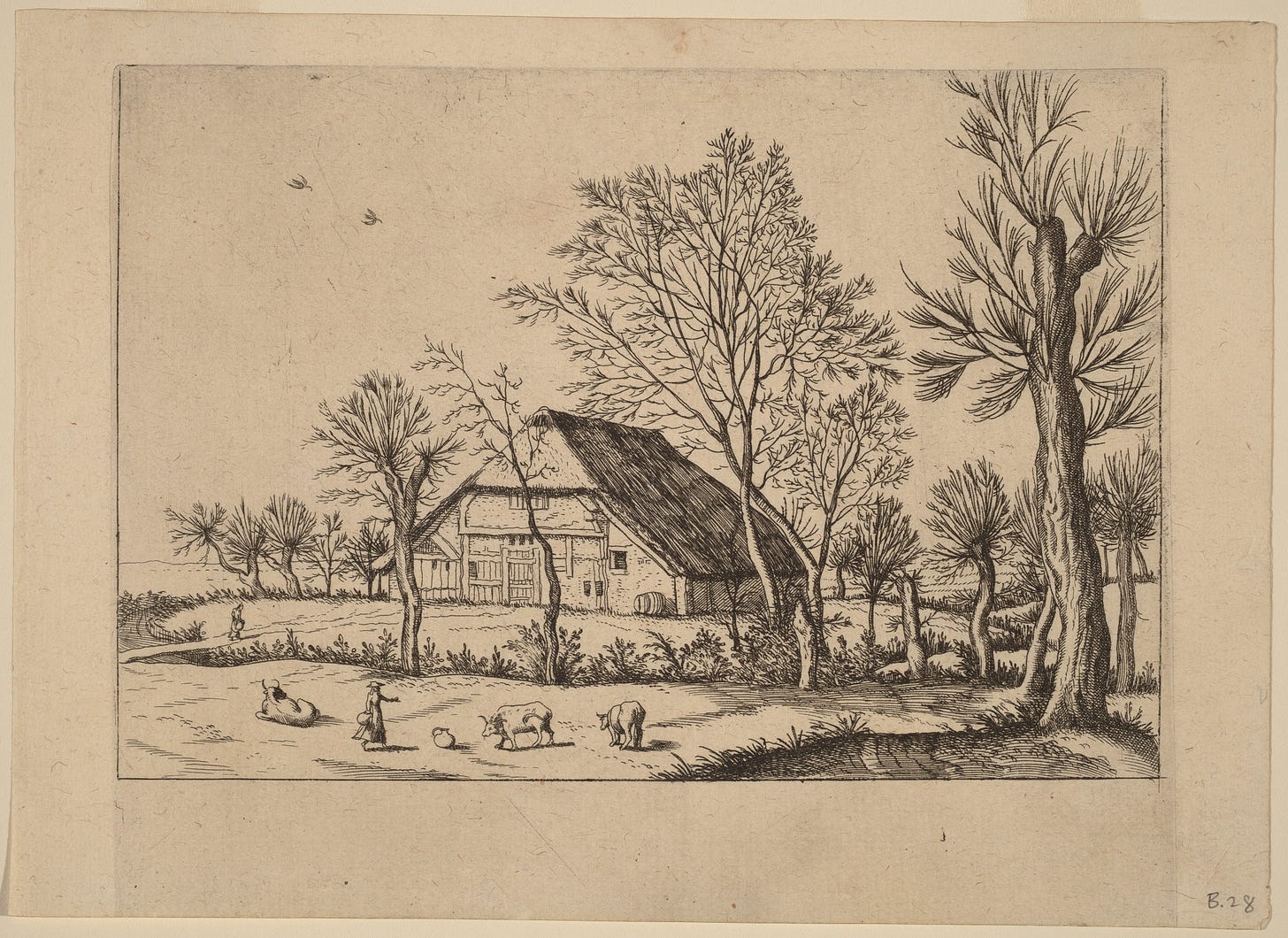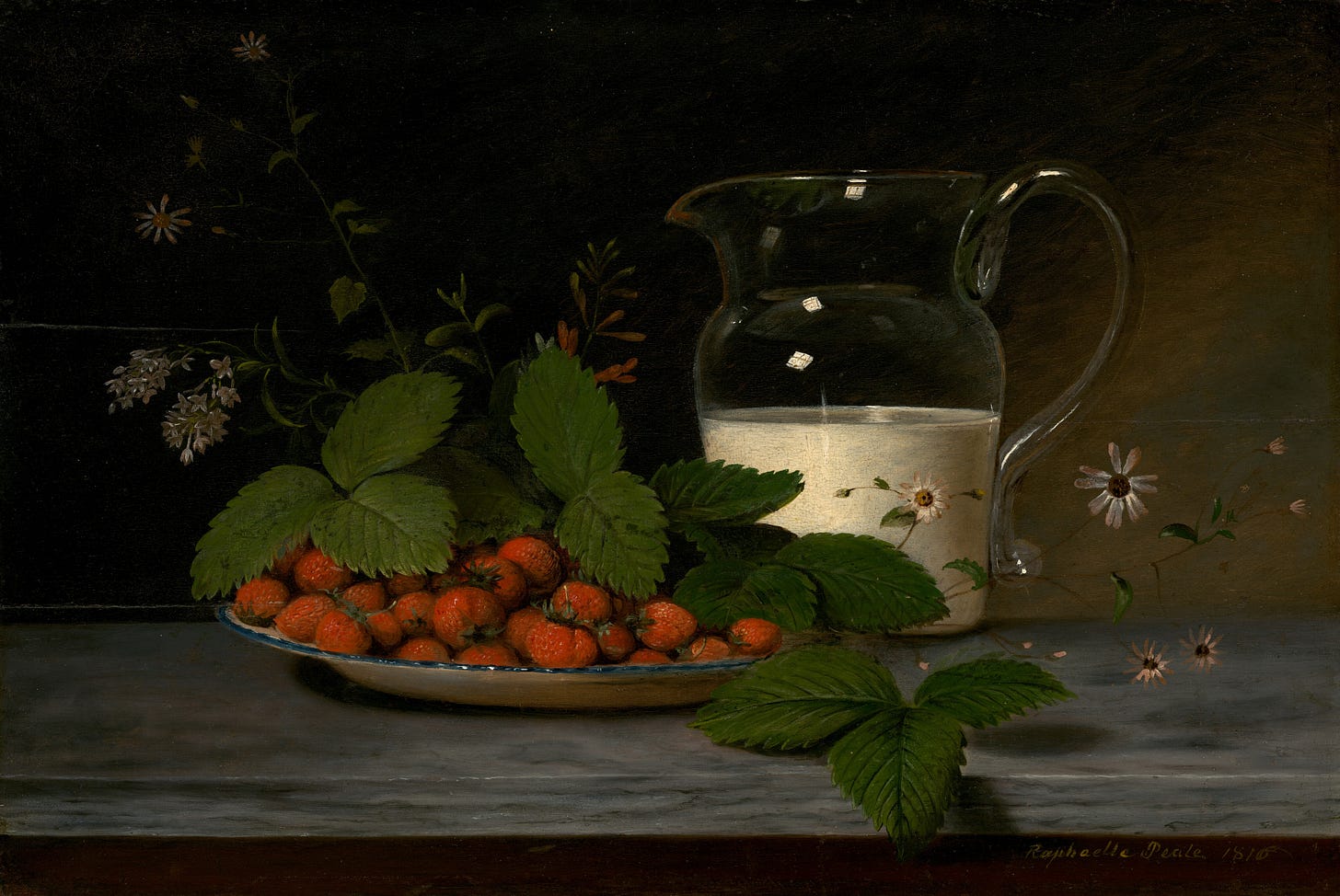This is an excerpt from an essay I wrote for the Anselm Society’s new book, Why We Create. I hope you enjoy it—and if you do, consider picking up a copy of the book and reading the whole thing!
Every spring at our old farmhouse in Virginia, a pair of finches would nest in the hanging plant I placed on our porch. As soon as I hung it outside in April, they took over: rummaging about to find the perfect spot for their eggs, nibbling off strands of petunia vine, slowly adding bits of found objects from the garden and yard to their creation.
As I watered the plant through the spring, the finch parents would watch me warily from a nearby tree branch. I peeked inside their nest, careful not to dampen it, and saw their fragile eggs inside. Eventually, I would see hatched baby birds nestled together, sleepy-eyed.
Together, year after year, these finches and I sought to provide a safe spot for these baby birds to grow and hatch. Our shared spring rhythm was oriented around patterns of nesting and nest-protecting that sought to nurture life—a rhythm, I would argue, embedded in the Scripture’s Creation story.
In the second verse of Genesis, we read of the “Spirit of God hovering over the face of the waters.” The verb merahefet in this sentence, often translated as “hover,” can also mean “brooded,” referring to a mother bird brooding over her young (as it does in Deuteronomy 32:11). What mysterious gentleness exists, then, in God’s acts of creation. The act of bringing order from chaos emerges as a powerful work of the Holy Spirit—one forged in the immense tenderness we associate with a bird that is “nesting.” In the fragility of life, in its tenuousness, God is present: and the cultivation of life happens in and through love’s enclosing of this fragility.
The word “cultivate” comes from the Latin cultiva, which refers to the tilling of land, and colere, “to till; to inhabit; to frequent, practice, respect; tend, guard.” As the various meanings of colere indicate, however, the term “cultivation” encompasses something more than tilling and planting: it suggests habits of constancy, care, and stewardship. We can only forge these habits, I argue, in and through the creative, life-nurturing love of God: love embodied in tactile objects and life forms, and in care for these objects and life forms. We are all called to “nest” in this world.
Alas, this is a work we have often done poorly or not at all throughout human history. Humans have often interpreted Genesis 1:28’s commands to “subdue” and to “have dominion” according to our interests and greed. In a framing of the Creation Mandate that justifies exploitation of God’s creatures and earth, humans position themselves not in harmony with, but in opposition to, plant and animal life on the earth. In our efforts to bring “order” to wild places, we destroy as much or more than we create. In our agricultural efforts to subdue the soil, we denude it and spray it with chemicals. And in our creative efforts—from the creation of smartphones to the cultivation of plastics—we create disastrous amounts of waste. We live not in harmony with our ecosystems, but at war with them.
We live not in harmony with our ecosystems, but at war with them.
In Fyodor Dostoevsky’s novel The Brothers Karamazov, a character named Father Zossima tells the story of his brother Markel, who died as a teenager. As he became ill, Markel experienced a remarkable conversion to Christianity. Some of his last words, related by Father Zossima, are captured thus—again drawing our eyes to birds in a garden:
The windows of his room looked out into the garden, and our garden was a shady one, with old trees in it which were coming into bud. The first birds of spring were flitting in the branches, chirruping and singing at the windows. And looking at them and admiring them, he began suddenly begging their forgiveness too: “Birds of heaven, happy birds, forgive me, for I have sinned against you too.” None of us could understand that at the time, but he shed tears of joy. “Yes,” he said, “there was such a glory of God all about me: birds, trees, meadows, sky; only I lived in shame and dishonored it all and did not notice the beauty and glory.”
“You take too many sins on yourself,” mother used to say, weeping.
“Mother, darling, it’s for joy, not for grief I am crying. Though I can’t explain it to you, I like to humble myself before them, for I don’t know how to love them enough.”
Merkel here defines sin—not just against our fellow humans, but against the world itself—in a way few others have managed to elucidate. We are surrounded by God’s glory, and amid that glory, we have not loved enough. Psalm 104 speaks of God’s active nurturing of the earth—He touches the earth (verse 32), waters the mountains (13), renews the ground (30), feeds His creatures (28), and takes away their breath (29). We, in contrast, have been sleepwalkers, dulled to the vibrant life of the world God has made. Because of our lack of care, we transgress against God, the humans made in His image, and the creatures He has wrought in love.
“…There was such a glory of God all about me: birds, trees, meadows, sky; only I lived in shame and dishonored it all and did not notice the beauty and glory.”
As noted above, the verbs “subdue” and “dominion” in Genesis 1 seem to justify the violence and destruction we see in the age of the Anthropocene. But this only emphasizes the importance of reading Genesis 1:28 with an understanding of the Spirit’s work of merahefet. As we are made in the image of God, our works of creation and cultivation are meant to mirror His own. The Creation Mandate, therefore, must point toward the gentleness and tenderness of God’s creative work, not away from it.
The Hebrew word translated as “subdue” here, kabash, implies an ordering and replenishing without violence or cruelty. It suggests instead a gentle work, one that echoes God’s own nurturing rhythms throughout Genesis 1. It affirms humanity’s active participation in God’s work of nesting and enfolding, protecting and cherishing. We, too, can brood in this earth: nurturing it, loving it, ordering it, and seeking its good.
In The Brothers Karamazov, Merkel offers a definition of love that speaks to the rhythms of cultivation I seek to highlight here. He suggests slightly earlier in this passage that we must “glorify life” in our work, play, lament, and care for the world. The right ordering of our work of cultivation must be forged in and through Merkel’s joyful grief and attentive humility, through the process of realizing how much more we must love. The Creation mandate emerges as “the creative effort to contribute to a flourishing world,” as Norman Wirzba writes in This Sacred World—an effort in which we tenderly care for human and nonhuman life.
Read more in Why We Create, edited by Brian Brown and Jane Scharl.

Book Club Announcement!
Starting on Tuesday (June 6) of next week, I’m beginning a book club + challenge for the months of June and July.
We will be slowly reading through Annie Dillard’s classic Pilgrim at Tinker Creek — but alongside that reading, I’d encourage you to join me in a challenge.
Each week in June and July, you have to pick a day to spend time outdoors—at least 30 minutes, preferably by yourself, and in relative silence. If you can’t leave your home because of childcare or other issues, perhaps you might take 30 minutes and spend some quiet time in your back yard, on your balcony, on the front step, or even in front of an open window. Perhaps your children can join you in the challenge, and enjoy that time together at a nearby park! You might take some time together to look for small birds, frogs, insects, new plant varieties, and the like. Nature journals, diaries, and books are welcome additions to this challenge.
The idea here is simple: we often struggle to pay attention. We’re busy, distracted, and overwhelmed. Even when we are outside, we often bring a to-do list with us, are keeping track of tiny adventurers, or have our smartwatch tracking steps and miles. What are we missing in the midst of the chaos, the lack of quiet? Whether it means sneaking out at 5 a.m. for a solitary neighborhood stroll, or setting aside a weekend evening to hike, garden, or sketch in silence, I hope this challenge will encourage you to slow down, to pay attention, and to appreciate the world around you in a new way.
If you haven’t purchased Dillard’s book (or rented it from the library), try to do so this weekend! I’ll have more details on Tuesday.
essays + news
Does agroforestry hold important answers for our time? Lisa Held writes: “Whatever the approach, more abundant plant life that stays put year after year—i.e., perennials—lead to healthier ecosystems that support biodiversity and store carbon. Indigenous cultures around the world, including Native American tribes, have long practiced various forms of agroforestry. And, as researchers, policymakers, and governments look for effective ways to reduce greenhouse gas emissions and build climate resilience on farms to secure the food supply, agroforestry is approaching a renaissance.”
Sarah Hendren considers the rhythms of provisionality essential to neighborhood care: “design gets its life from daring to commit—to place some objects in public space, to fill the void of a blank script—while also cultivating an open-handed process.” (h/t Other Feminisms)
Chris Arnade argues that in the U.S., “you end up building the least to protect against the worst — the constraints of both regulations and behavior results in things the majority doesn’t want, or doesn’t find useful.” The results? “We are rapidly falling behind the rest of the world in livability, especially when you adjust for our wealth.”
The United Nations has declared that 2023 is the International Year for Millets—a grain that is drought-resistant, “extremely sustainable, weather resilient, nutritious and could help diversify the global food system.”
food + drink
Eager to try this cardamom and lemon loaf cake.
Thai green curry with spring vegetables — our favorite on rainy days.
A spicy garlic spinach pasta that’s perfect for a quick weekday dinner.
These churro cinnamon squares are good. Almost too good. Perhaps even dangerously good. You’ve been warned.




Hi Gracy. I am so happy to see that you're back at doing what you do best: write about topics you love. You do this so well. And I'm happy to be again in your book club. I always learn so much from you and I welcome this respite away from this hectic world.